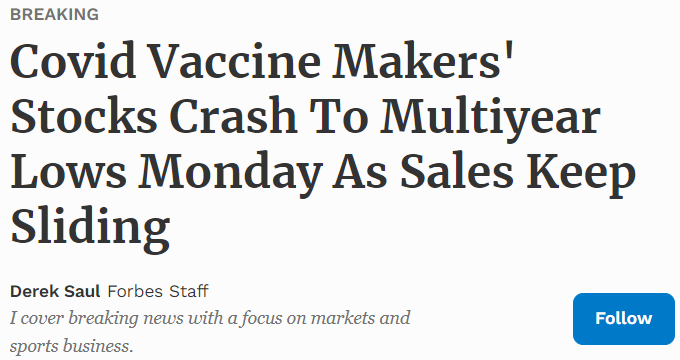As COVID vaccine makers' stocks plummet makers of weight-loss drugs such as Eli Lilly see a sharp increase
As COVID interests wane attention has moved towards other profitable health emergencies.
Correction 8.11.2023: The article referenced Ozempic when it was Wegovy that was tested in the SELECT trial. Apologies for the mix-up. A correction has been made.
I’m usually not one to cover topics on economics. I’ll save more of that stuff for more knowledgeable people such as Peter Nayland Kust of All Facts Matter. Check out his articles for daily information on the goings on related to global economics.
Although my knowledge on economics and stocks are limited they are still rather telling of the medical, and really cultural climate.
For instance, it’s been reported that Pfizer’s stocks have been on the steep decline- a decline that has been occurring for the better part of 2023.
But this decline has been made apparent from a recent earnings report which noted a drop of nearly 95% in earnings from the previous quarter when compared to the same quarter last year.

Some of these key findings were reported in Fortune, which also noted that Moderna’s stocks have plummeted:
BioNTech and Moderna’s stocks fell 8% and 6%, respectively, a decline spurred by BioNTech’s earnings report revealing the German firm’s sales fell 95% year-over-year last quarter.
Moderna’s fresh decline came after it reported a 93% annual decline in quarterly revenues in its own earnings release Thursday.
Moderna’s $101.20 close Monday was its lowest since November 2020, while BioNTech’s $98.50 close was its lowest since March 2021.
BioNTech, which developed a Covid vaccine with Pfizer, said Monday it expects to generate $5.5 billion in Covid vaccine sales this year, a 70% decline from 2022, while Moderna’s $6 billion to $8 billion in forecasted Covid jab sales is similarly about two-thirds below its $18 billion of revenue in the unit last year.
The stock crashes moved against broader market gains, with the Dow Jones Industrial Average’s 408-point, or 1.2%, rally its strongest since June 2.
Most of these drops seem to be due to waning interest with both COVID vaccines and treatment options. As many of these giant pharmaceutical companies lose government contracts and move more into the typical realm of marketing and distribution the public doesn’t seem to be as interested in these products, especially as things return to normalcy.
This is, for the most part, a good sign for those critical of the incentive structures that mandated boosters and specific treatment protocols for dealing with the pandemic.
Nonetheless, as interest in these companies wane interest has been diverted to other areas, especially in the world of weight-loss drugs.
I’ve covered this topic quite a bit in recent posts due to growing interest, so it’s no surprise that companies such as Eli Lilly are reporting booming sales and stock prices, all likely thanks to the company’s own GLP-1 receptor agonist Tirzepatide (brand name Mounjaro)1 which comes as a myriad of other GLP-1 RAs make their way to the market.
This comes as a recent survey, covered by USA Today, suggests that nearly half of all Americans would consider taking a safe and effective weight-loss drug:
A KFF health tracking poll published Friday found 45% of people are interested in taking a safe and effective weight loss medication. An even larger share of people want to take weight-loss drugs if a doctor has told them they're overweight. But just 16% of adults said they would choose these drugs if insurance refuses to cover the medications, some of which can cost over $1,300 per month.
Surprisingly, this interest is not reserved just for those who are obese. Rather, those who wish to lose only a few pounds appear to show interest as well:
And interest in the drugs isn't limited to those who are seeking to shed a lot of weight. Slightly more than half of respondents who want to trim 10 or fewer pounds said they'd take a weight-loss drug if safe and effective. And nearly 1 in 4 people not trying to lose weight said they'd be interested in taking such drugs, the survey found.
It’s interesting that the phrase “safe and effective” is being used here, especially given recent reports and possible lawsuits alleging stomach paralysis for a few people who have chosen to take these drugs.2
In any case, all of this provides further emphasis that the drugs that make it to market are ones that show the highest public interest. Thus, it becomes the interest of pharmaceutical manufacturers to entice and persuade the public to want medications, and fast. We are seeing more evidence that drugs are being pushed through with limited clinical efficacy, as several of these Alzheimer’s immunotherapies seem to highlight this growing issue.3
Recent reports have even suggested a possible cardiovascular benefit with Novo Nordisk’s GLP-1 RA Wegovy, which have spiked the stock of this company in recent days as well:

As demand has increased so too have the pressures on insurance companies to cover the costs of these expensive drugs- again, a similar issue that has come up with drugs such as Leqembi.
Keep in mind that many of these GLP-1 RAs are also being used off-label for weight loss, and so companies may push for accelerated approval to get these drugs considered as weight-loss treatment options, which may then lead insurance companies to consider covering these drugs.
The end goal, consequently, is even further dependency of the public on medical institutions. We’re essentially moving from one disaster to another, with pharmaceutical companies ready to sell any treatments they may have.
Substack is my main source of income and all support helps to support me in my daily life. If you enjoyed this post and other works please consider supporting me through a paid Substack subscription or through my Ko-fi. Any bit helps, and it encourages independent creators and journalists such as myself to provide work outside of the mainstream narrative.

Covered in a prior post for those interested:







I take Primidone, an old epilepsy medication that just happens to help with my essential tremors. And I pay nothing. Just think if we had had Ivermectin and hydroxycloriquine available or other options. Cheap and effective. It makes me sick to think of the lives that were lost. I could care less about Pfizer, Moderna and the rest. They chose profit over people's lives. I hope they go out of business.
Peter Nayland Kust of All Facts Matter. it's the pharm-con "pivot and twist" method. Been in use for well over a hundred years now😉🤦♀️
Ps. Love that you mentioned Peter from All Facts Matter Substack. He's my go to guy for watching the global markets and all things economics.👏👏👏